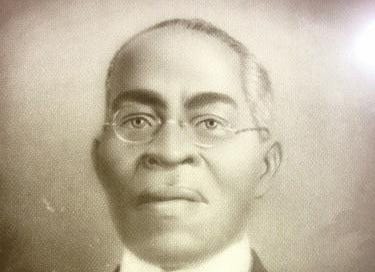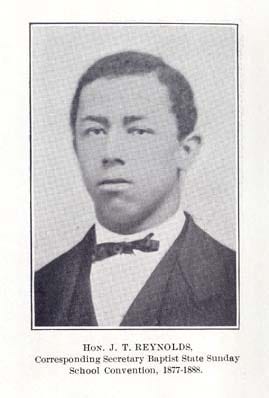More tales of North Carolina's 19th-century African American legislators
Part 3: More members of the 1868-1870 General Assembly
Earlier this year, I began introducing readers to a handful of African American legislators elected to the North Carolina General Assembly during the nineteenth century, among more than 125 black state legislators, all Republicans, who held office between 1868 and 1900.
This week, I continue my occasional series on North Carolina’s black public servants during the period, many of whom I have written about in previous articles for the North Carolina Historical Review and in other publications. Today’s post explores the lives of some of the nearly two dozen legislators who served in the first session of the General Assembly elected under provisions of the new 1868 state constitution:
William W. Cawthorne (1832-1912?), of Warrenton, served two terms in the N.C. House of Representatives from Warren County as a Republican, elected in 1868 and 1870. Cawthorne was born a slave between 1832 and 1836, probably in Warren County. A mulatto, he was a teacher, farmer, storekeeper, and shoemaker.
After the Civil War, Cawthorne was a delegate to the North Carolina black convention in 1865 (where he was elected assistant secretary); he was a delegate to the State Equal Rights League Convention of Freedmen in Raleigh in October 1866, and served on the executive committee of the Equal Rights League.
In 1870, he owned $750 in real estate and $200 in personal property. Cawthorne was among 12 incorporators of the Warren County Co-operative Business Company authorized by the General Assembly in 1869.
He also became active in the Republican Party. In 1868, he was chosen as a Republican nominee for an N.C. House seat from Warren County, and elected that spring under the provisions of the state’s new Constitution. He first served in the 1868-1870 session of the General Assembly, and was assigned to the Committees on Education, Privileges and Elections, and Internal Improvements. After being reelected to the House in 1870, he served on the Committee on Education.
Cawthorne was married to his wife, Alice Turner (or Towner), in 1869. They had at least 14 children, seven of whom lived to adulthood, including two sons, Caesar Jackson Cawthorne (b. 1891) and William (b. 1885). Children’s names listed in the 1880 census included Annie, Pattie, Elijah, and Seaward Cawthorne.
Cawthorne’s death date and place of interment are unknown. He is presumed to have died in Warren County sometime after 1911 and before 1928, when his widow died.
* * * * * *
A. A. Crawford (1833–1897), of Oxford, served one term in the N.C. House of Representatives from Granville County as a Republican, elected in 1868. He was born in 1833, probably enslaved, in Granville County. Little is known about his early life or education.
After the Civil War, he became active in the Republican Party, and was selected by Granville County party leaders as a nominee for the N.C. House in 1868. Elected under provisions of the state’s new constitution that spring, he served in the 1868-1870 session of the General Assembly. During that session, he was assigned to the House Committees on Penal Institutions and Propositions and Grievances.
He did not seek reelection in 1870, and held no public office after leaving the legislature. The names of his wife and children, if any, are not recorded.
Crawford reportedly died in Granville County in 1897. His place of interment is not known.
* * * * * *
Henry Eppes (1830-1903), of Halifax Courthouse, served five terms in the N. C. Senate from the 6th and 4th districts (Halifax County) as a Republican, elected in 1868, 1870, 1872, 1878, and 1886. Eppes was born a slave on September 16, 1830, probably in Halifax County. While he had no formal schooling, he was literate, and became a Methodist minister; by trade, he was a mason and plasterer.
After the Civil War, Eppes became active in the Halifax County Republican Party, and was selected as a Halifax delegate to the state’s 1868 constitutional convention. In the spring of that year, he was nominated for and elected to his first term in the N.C. Senate, during the 1868-1870 session of the General Assembly. He served on the Senate’s standing committees on Privileges and Elections and, Corporations, and on the special Committee on Choosing a Penitentiary Site. In 1869, he was assigned to the Agriculture and Special Roads Committees.
Eppes was subsequently reelected to the Senate in 1870, 1872, 1878, and 1886, and served in the 1870-1872, 1873, 1879, and 1887 sessions of the General Assembly. During the 1879 Senate session, he served on the Committees on Propositions and Grievances and Corporations.
Eppes was one of 14 signers of a public statement congratulating Ulysses S. Grant on his election to the U.S. presidency, published December 2, 1868, in the North Carolina Standard. In 1872, he served as an alternate delegate from the Second Congressional District to the GOP national convention. He was also a Halifax justice of the peace.
He was married to Lavinia Knight; they had at least 13 children, with seven still alive in 1879, according to his biographical sketch that year. Son Charles Montgomery Eppes (1857-1942), longtime superintendent of the Greenville City black school system, was one of the best-known educators in eastern North Carolina in the twentieth century.
C. M. Eppes (1858-1942), well-known N.C. educator and son of Henry Eppes, longtime member of NCGA.
Photo courtesy Greenville Daily Reflector
Henry Eppes died in Halifax County on or about January 29, 1903. His place of interment is not certain, but he is believed to be buried in Halifax County.
* * * * * *
W. T. J. Hayes (1832-1899?), of Halifax County, served one term in the N. C. House of Representatives from Halifax County as a Republican, elected in 1868. Hayes was born a slave in 1832/33, probably in Halifax County. Little is known about his early life or education. He is believed to have been a farmer.
After the War, he became active in the Halifax County Republican Party, and was appointed as a justice of the peace in Halifax County in 1868 and 1873. He was elected coroner of Halifax County in 1873 and 1874. In 1870, he owned no property, according to the U.S. census.
In 1868, he was chosen as one of the Republican nominees for Halifax County seats in the N. C. House, and was elected that spring to serve in the 1868-1870 session of the General Assembly. He was assigned to the House Committee on Military Affairs, as well as to the Joint House-Senate Library Committee.
Hayes was one of 14 black legislators to sign a December 2, 1868, statement, published in the North Carolina Standard, congratulating Ulysses S. Grant on his election to the U.S. presidency. He did not seek reelection in 1870.
While serving in the legislature, he was a cofounder of the Halifax County Co-operative Business Company, chartered by the N.C. General Assembly in April 1869, along with Chas. Smith, Reddick Barnett, Robert Howard, Henry Eppes, Andrew Jackson, and Robert Knight.
His wife’s name may have been Julia Hayes, and they may have had a daughter named Della. The names of his other children, if any, are not recorded.
Hayes’s death date and place of interment are unknown. He is presumed to have died in Halifax County sometime before 1900.
* * * * * *
John Thomas Reynolds (1848–1922), of Enfield, served three terms in the N.C. House of Representatives: one term from Northampton County as a Republican, elected in 1868; and two terms from Halifax County as a Republican, elected in 1876 and 1878. Reynolds was born free on March 28, 1848, in Murfreesboro. Little is known of his early life; by trade, he was a mechanic and painter.
Reynolds attended the private Shaw University, at least for the 1876–1877 term; he did not graduate, but assisted as a teacher there. An active Baptist layman, he served as corresponding secretary of the N.C. Baptist Sunday School Convention from 1877 until 1888.
John Thomas Reynolds served in the NCGA in 1868-1870, 1877-1880.
Photo courtesy J. A. Whitted, A History of the Negro Baptists in North Carolina (1908)
After the Civil War, Reynolds first became active in the Northampton County Republican Party, and was selected as the party’s nominee for a seat in the N.C. House in 1868. Elected that spring, he served in the 1868-1870 General Assembly, and was one of 14 black legislators who signed a public statement congratulating Ulysses S. Grant on his election to the U.S. presidency, published December 2, 1868, in the North Carolina Standard. He did not seek reelection in 1870.
In 1870, after completing his legislative term, he was elected as a Northampton county commissioner, and served at least until 1872, according to Branson’s directory of that year. Reynolds moved to Halifax County a year later, and was appointed as a Halifax County magistrate in 1877.
In 1876, he was chosen by the Halifax Republican Party to represent the county in one of its seats in the N.C. House, and was duly elected, without opposition, to serve in the 1877 session of the General Assembly. After being reelected in 1878, again without opposition, he served in the 1879 session of the General Assembly, and was assigned to the House Committees on Finance and Education.
After leaving the legislature in 1880, he was selected as an alternate statewide delegate at large in 1888 to the G.O.P. national convention, which nominated Benjamin Harrison for the U.S. presidency.
He was married twice. In 1875, he was married to a Miss Warrick, whose first name is not available; by 1880, he was married to Leah P. Reynolds, according to the U.S. census, and they had at least one daughter, Anna.
Reynolds died in 1928. He is buried in the graveyard at the St. Elmo Missionary Baptist Church, the church he helped found in Windsor in the 19th century.
Next time: Life in the Foreign Service: Department of State, Washington, D.C.





